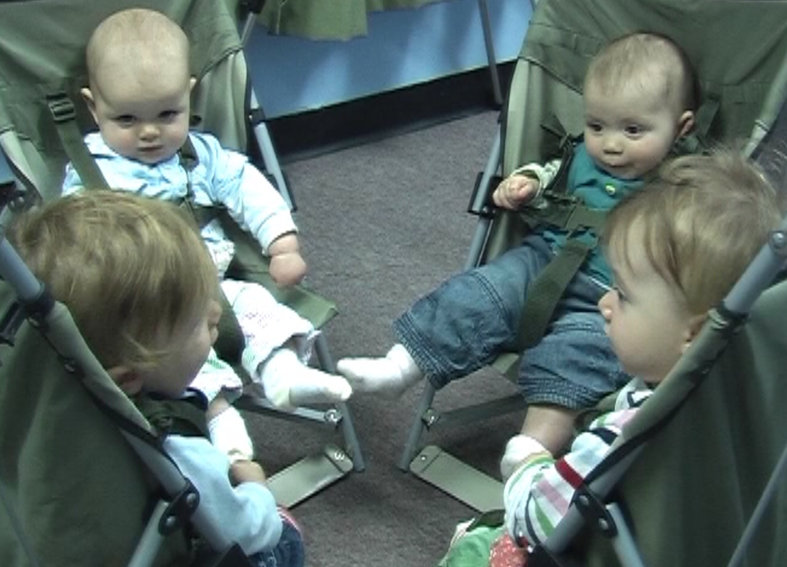
This is not Happening: Exploring Infant Quartet Dynamics
In the thought-provoking chapter “This Is Not Happening,” a ground breaking shift occurs from studying infants in all-baby trios to examining baby-only quartets. By venturing beyond familiar cultural narratives that focus on individuals, couples, or “jealous” threesomes, the chapter tackles the complexities of group dynamics in infants. Through extended vignettes, it becomes evident that baby foursomes engage in multi-member conversations, overlapping interpersonal routines, dynamics of linking and attacks on linking, moments of individuation, and cooperative efforts to maintain cohesion. These interactions implicate individual histories and shed light on the challenges of interpreting human agency within groups.
The detailed analyses presented in “This Is Not Happening” highlight the inherent difficulties in understanding and interpreting the complexity of human agency within group settings. Infants in quartets engage in intricate interpersonal exchanges that require careful observation and analysis. The chapter emphasizes the value of ethnographic methods and theory in unravelling the intricacies of these interactions. By employing qualitative approaches and providing rich descriptions of the observed behaviours, the chapter offers insights into the multifaceted nature of infant group dynamics.
“This Is Not Happening” presents statistical evidence to support the existence of group-level interactions within infant quartets. For instance, the chapter reveals that the actions of one group member at a given time (Q) are significantly influenced by the behaviours of two or more other group members at a previous time (P). These statistical findings underscore the interconnectedness and interdependence of infants within their social groups.
The chapter also delves into the implications of infants’ participation in groups for the psy-professions, including psychology and psychiatry. Infants’ active engagement in complex group interactions poses theoretical, cultural, and emotional challenges for these professions. The chapter prompts a critical reflection on the traditional understanding of individualistic approaches to psychological and emotional development, encouraging a shift towards acknowledging the significance of group dynamics and social contexts in shaping human experiences.
By examining the interactions within baby quartets, “This Is Not Happening” highlights the rich tapestry of human agency within group settings from an early age. The extended vignettes paint a vivid picture of infants engaging in conversations and shared routines, navigating the dynamics of linking and individuation, and collaborating to maintain group cohesion. These observations challenge traditional notions that infants are passive recipients of social interactions, instead emphasizing their active participation and contributions to group dynamics.
Furthermore, the chapter underscores the value of ethnographic methods and theory in studying complex human interactions. By immersing themselves in the detailed examination of observed behaviours, researchers gain a deeper understanding of the nuanced dynamics at play. Ethnographic approaches provide a holistic perspective that acknowledges the context and cultural influences shaping these interactions.
In “This Is Not Happening” expands our understanding of infant group dynamics by shifting the focus from all-baby trios to baby-only quartets. The chapter highlights the complexity of infant agency within groups, showcasing multi-member conversations, overlapping routines, dynamics of linking and attacks on linking, individuation moments, and cooperative efforts to maintain cohesion. It underscores the challenges of interpreting these interactions and emphasizes the importance of ethnographic methods and theory. By recognizing the statistical evidence of group-level interactions and considering the implications for the psy-professions, “This Is Not Happening” paves the way for a deeper understanding of the social and emotional development of infants within group contexts.


Gaming enlightenment! Chrome Dinosaur teaches us that less truly is more.
Masterful perspective! The Sprunki Retake platform transforms creativity. Sprunki Retake offers unprecedented freedom in musical expression. The depth that Sprunki Retake brings to composition is extraordinary.
[b]Prevent Vibration Damage – Get Professional Balancing with Balanset-1A[/b]
Unbalanced rotors can cause serious damage to your machinery. Bearings wear out faster, motors consume more power, and failures lead to expensive repairs. [b]Balanset-1A[/b] provides professional-grade vibration diagnostics and balancing, helping businesses save money and improve reliability.
[b]Key Benefits:[/b]
– [b]Accurate & fast diagnostics[/b] – Identifies imbalance before it causes damage
– [b]Portable & efficient[/b] – Suitable for field and workshop use
– [b]User-friendly software[/b] – No special training required
[b]Choose Your Kit:[/b]
[url=https://allegro.pl/oferta/przenosny-wywazarka-i-analizator-drgan-balanset-1a-kompletny-zestaw-16654413800]Full Kit on Allegro[/url] – Includes all necessary sensors, software, and a protective case
Price: [b]9990 zl[/b]
[url=https://allegro.pl/oferta/przenosny-wywazarka-i-analizator-drgan-balanset-1a-kompletny-zestaw-16654413800][img]https://i.postimg.cc/qRGZsm5H/77-e1693745667801.jpg[/img][/url]
[url=https://allegro.pl/oferta/balanser-dynamiczny-balanset-1a-oem-set-16713019136]OEM Kit on Allegro[/url] – More affordable, comes with basic components
Price: [b]8800 zl[/b]
[url=https://allegro.pl/oferta/balanser-dynamiczny-balanset-1a-oem-set-16713019136][img]https://i.postimg.cc/htq3fzsd/image.jpg[/img][/url]
Protect your equipment today with [b]Balanset-1A[/b]!